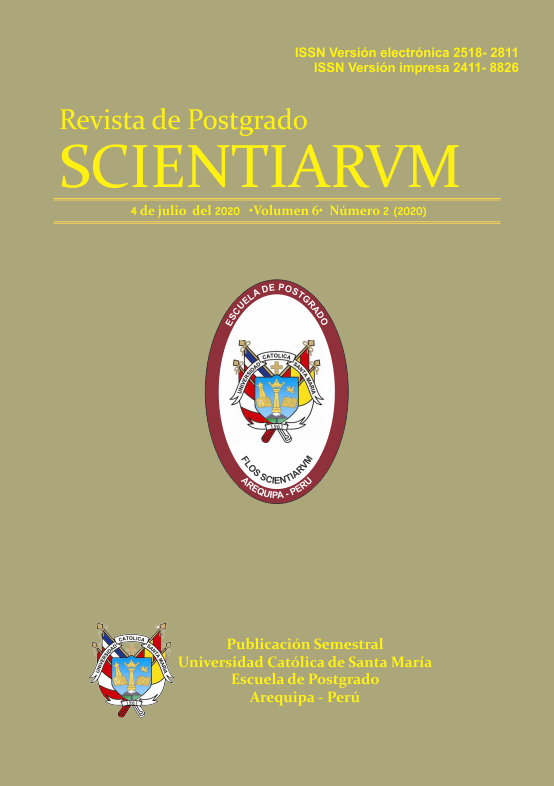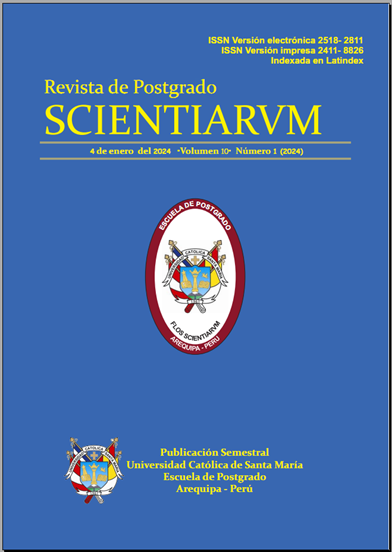ESTRATEGIAS DE ENSEÑANZA Y NIVEL DE SATISFACCIÓN ACADÉMICA DE ESTUDIANTES DE LA ESCUELA PROFESIONAL DE TURISMO Y HOTELERÍA DE LA UNIVERSIDAD CATÓLICA DE SANTA MARÍA, AREQUIPA, 2018.
Yudy Djanira Wagner Carrillo1, Rosa Patricia Beltrán Molina1
- Universidad Católica de Santa María, Arequipa - Perú
RESUMEN: El objetivo de la presente investigación es determinar la relación entre las estrategias de enseñanza y el nivel de satisfacción académica de estudiantes de la Escuela Profesional de Turismo y Hotelería de la Universidad Católica de Santa María de Arequipa, la población o universo está conformada por 157 estudiantes matriculados en el semestre par del año 2018, el estudio es de diseño no experimental correlacional de corte transversal y nivel explicativo, tipo básico con un enfoque cuantitativo, desarrollada en el área de la educación superior universitaria; aplicando dos cuestionarios, el primer cuestionario sobre el uso de estrategias de enseñanza y el segundo cuestionario sobre la satisfacción académica de los estudiantes de la EPTH, ambos instrumentos validados por juicio de expertos con un resultado de aplicabilidad, la confiabilidad se determinó mediante el coeficiente Alfa de Cronbach, obteniendo como resultado 0.89 y 0.96 respectivamente para cada variable y el estadístico Chi Cuadrado, hallando que las estrategias más utilizadas por los docentes son las centradas en la transmisión de la información con el 37.6%, consideradas como estrategias de enseñanza tradicionales y el mayor porcentaje de satisfacción académica se relaciona con el nivel de autorrealización del estudiante con un 51%; como conclusión tenemos que existe relación positiva entre las estrategias de enseñanza y la satisfacción académica de estudiantes de la Escuela Profesional de Turismo y Hotelería de la Universidad Católica de Santa María (P<0.05; según tau b de Kendall existe una correlación moderada π=0.51).
Palabras Clave: Estrategias de enseñanza, satisfacción Académica, estudiantes universitarios, estudiantes de turismo, educación superior y calidad educativa.
ABSTRACT: The purpose of this research is to determine the relationship between teaching strategies and the level of the students’ academic satisfaction at the Professional School of Tourism and Hospitality at the Catholic University of Santa Maria; the population or universe is made up of 157 students enrolled in the Pair Semester 2018, the study is of a non-experimental, cross- sectional correlational design and explanatory level, basic type with a quantitative approach, developed in the area of university higher education; applying two questionnaires; the first one, is a questionnaire about the teaching strategies and the second one is a questionnaire about the students’ academic satisfaction in the PST&H, both instruments validated by experts’ judgment with a result of applicability, the reliability was determined using the Alpha de Cronbach Coefficient, obtaining a result of 0.98 and 0.96 respectively for each variable and the Chi Square statistical, finding that the most used strategies by teachers are those focused on the transmission of information with 37.6%, considered as traditional teaching strategies and the highest percentage of academic satisfaction is related to the level of student self-realization with 51%; as a conclusion we have that there is a positive relationship between teaching strategies and the students’ academic satisfaction at the Professional School of Tourism and Hospitality at the Catholic University of Santa Maria (P<0.05; according to tau b de Kendall there is a moderate correlation π=0.51).
Keywords: teaching strategies, academic satisfaction, university students, higher education and educational quality.
Revista Seleccionada
Julio 2020 Volumen 6 - Número 2 P 9-14
DOI: 10.26696/sci.epg.0114
Enlaces
CIENCIAS SOCIALES Y HUMANIDADES
TENDENCIA DEL COWORKING EN AREQUIPA-PERÚ
CIENCIAS BIOLÓGICAS Y DE SALUD
MICROBIOMA: AMIGO O ENEMIGO EN PACIENTES CON COVID - 19
RETINOPATÍA HIPERTENSIVA ASOCIADA CON ENFERMEDAD HIPERTENSIVA DEL EMBARAZO EN ALTURA
AUTOLESIONES DENOMINADAS CUTTING EN ADOLESCENTES DE AREQUIPA
EXPRESIÓN DE P53 EN CULTIVO DE CÉLULAS MADRE AISLADAS A PARTIR DE QUISTE RADICULAR INFLAMATORIO


